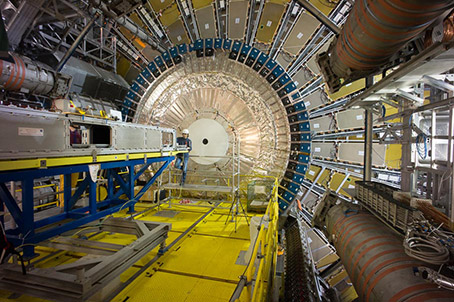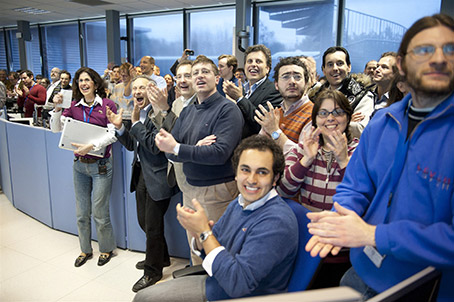| |
"Ever since I entered physics, people have been talking about this machine. The Large Hadron Collider, the biggest machine ever built by human beings, is finally going to turn on. And after many, many years of waiting and theorising about how matter got created and about what the deep fundamental theory of nature is, all those theories are finally going to be tested. And we're going to know something, and we don't know what it's going to be, now. But we will know, and it's going to change everything." |
|
David Kaplan, Theoretical Physicist |
I may be wrong here, but it seems to me that rarely if ever have theoretical physicists been more in the public eye. A few years ago most of us were not even aware that there was such a term – it does, after all, sound more like a description of someone who is theoretically a physicist – and few would have realised that it could be a full time profession. These people, after all, are essentially paid to theorise about the structure of our world, the universe and just about everything in terms of mathematical formulae. In the immediate aftermath of a post-apocalyptic world, they'd be initially about as much use as stockbrokers, advertising executives or film critics. They could doubtless tell you how the civilisation collapsed on itself in fascinating detail, but what you'd really be looking for then is someone who could dress wounds or build shelters or hunt for food. If recent episodes of The Walking Dead are anything to go by, they'd probably end up being your next meal. Sorry, but times are hard and fresh meat is scarce.
But with the world currently still in one piece and curiosity about the origin and structure of the universe seemingly greater than it ever was, theoretical physics is almost in danger of being the new rock 'n' roll. The runaway success of The Big Bang Theory has made geeky science seem cool, Stephen Hawking turned theoretical physics into a best seller that apparently has been read by precious few who bought it, and Brian Cox has encouraged us to marvel at the universe and has become the field's first legitimate sex symbol; unless you count Albert Einstein, of course, the first poster boy for theoretical physics and a man that Marilyn Monroe apparently had a serious thing about.
That most of us don't really understand the very theories that these fine people expound doesn't seem to matter. Their intelligence and passion for their subject makes them interesting by default, and the terms that they use – things like String Theory, Multiverse, Supersymmetry and the self-important sounding Grand Unification Theory – are intriguing enough for us to watch the amiable Mr. Cox as he attempts to clarify them on TV, or listen to The Infinite Monkey Cage, the podcast he hosts with comedian Robin Ince. If you have even a passing interest in science and have not managed to catch it, it's a show I'd highly recommend (you can catch it here).

For some years, the Holy Grail of theoretical and experimental physics (the theorists come up with the ideas, the experimentalists put them to the test) is what is commonly known as the Higgs particle, or Higgs boson, the existence of which was theorised by English theoretical physicist Peter Higgs and his colleagues in 1964 and for years was a crucial undiscovered element of the Standard Model of Physics. See, I've probably lost half of you just with that statement.
Now I'm not trying to claim that I have a clear understanding of what I've just said, but I definitely have a better idea than I did when I sat down to watch Particle Fever, Mark Levinson's fascinating documentary about the early days of the Large Hadron Collider located at CERN in the suburbs of Geneva, from its first test run through to a ground-breaking announcement made in July of 2012 by scientists who are based there. I'm trying to be cagey in case there are those who know nothing of the work at CERN and want to go into this movie cold. It's worth doing so if you can.
The film takes an insider's view of events from its opening frames, and given the background of the duo behind the project that's hardly surprising. Director Mark Levinson is a former theoretical physicist turned filmmaker (he worked formerly as an ADR supervisor and editor) and producer David Kaplan is a professor of theoretical particle physics at Johns Hopkins University with a particular interest in the Higgs mechanism. Just the people you need to go in with a camera and talk to those who were central to this process, then. Except they didn't. The film is actually assembled from almost 500 hours of existing footage shot by professional film crews and by the scientists themselves. At least that's the official story. Given that two cameramen are credited I can't help suspecting that at least some new material was shot specifically for this film and incorporated into the mix.
But Levinson and Kaplan's ace in the hole is editor Walter Murch, he of The Conversation, Apocalypse Now and The Talented Mr. Ripley, and one of Hollywood's most revered and respected editors and sound mixers. Together they shape this mountain of footage into a film with the educational value of a science documentary but the drive and narrative structure of a drama, one with its fair share of triumphs and set-backs and even a rousing climax, albeit one that should only surprise those who have not been keeping up with the news.
By focussing on the work and the reactions of six specific scientists, the film personalises events in a manner that enables us to almost share their excitement and anticipation at just what the experiments at the Large Hadron Collider might ultimately reveal. The scene is economically set by placing us in the audience of a lecture by Theoretical Physicist David Kaplan, who usefully outlines the history and aims of the LHC project and delivers a rather neat retort to an accountant who – of course – wants to know what the economic value of the results will be. Also with their eyes on the project are Kaplan's former mentor Savas Dimopolous and Iranian born Nima Arkani-Hamed, who is generally regarded as the hotshot physicist of his generation. Over at CERN, a little gender balance is provided by experimental physicist and project leader of the Atlas Experiment team, Fabiola Gianotti, and young, enthusiastic and just slightly hyper student Monica Dunford, who landed a postdoc position at CERN at a most fortuitous moment in its history. Rounding off the lead players is Atlas Experiment Run Co-Ordinator Martin Aleksa, who entertains his kids with simple demonstrations of scientific principles.

How much to reveal about what unfolds over the course of the film's waste-free 99 minutes is a tricky call. If you know little or nothing about the Large Hadron Collider and what, to date, has been its biggest discovery then you're far better off watching the film than reading it here. The story will be more entertainingly told, and clear explanations are provided en route of the function of the Collider and the theories that it has been constructed to test, which are aided by attractively designed and usefully illustrative animated graphics by design and filmmaking collective MK12. The scientific stakes are also made plain, with the weight of the Higgs boson, should it actually be discovered, having the potential to bring the whole field of particle physics to an end if it were heavy enough to confirm the Multiverse theory (oh just see the film – it makes perfect sense when Kaplan explains it).
The film does a solid job of debunking the commonly held super-nerd image of the particle physicist, an aspect most amusingly illustrated by the unnamed and plain-speaking English scientist whose reaction to the catastrophic damage caused to the Collider by a helium leak is a shocked, "Fuckin' hell, look at that!" Having said that, the horrible rap about particle physics that is performed live at the Atlas experiment start-up celebration comes close to setting off every nerd alert on the planet. The sheer volume and range of footage at the filmmakers' disposal provides the film with a number of memorable character moments, the most frustratingly unfair of which sees Savas Dimopolous, a man whose theories are being tested by the Collider, travel from the USA to CERN to be present at the climactic ground-breaking announcement and be refused entry to the hall because he arrives late.
Particle Fever strikes a spot-on balance between character, storytelling and educational science. I remained fascinated throughout and at no point did I feel that the science was flying hopelessly over my head. It makes for an enthralling introduction to the world of particle physics, one whose insiders' view is so enthralling at times that I was happy to turn a blind eye to the almost orgasmic explosion of graphics that accompanies the first successful beam collision. It's a really well made film, save for one editing decision that I do not understand the thinking behind (seriously, this where you need to bail out if you want to avoid spoilers). At the film's most emotionally triumphant moment, Peter Higgs himself reacts to the announcement that the particle he and his colleagues proposed the existence of so many years ago by lifting a hankie to wipe a tear from his eye, and just before he is about to do so, we cut away to a shot of two scientists who are watching the whole thing remotely on their MacBook Pro (a computer that every particle physicist on the planet seems to own), then cut back to Higgs immediately after this touching moment of emotional expression has passed. I have absolutely no explanation for why an editor of Murch's skill and experience would do this, but presume there has to be a damned good reason. Maybe theoretical physicists just don't like seeing themselves cry on screen, whatever the reason. Personally, I'd say Professor Higgs earned those tears. |